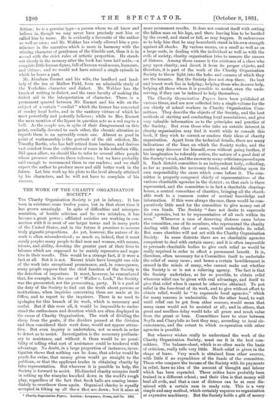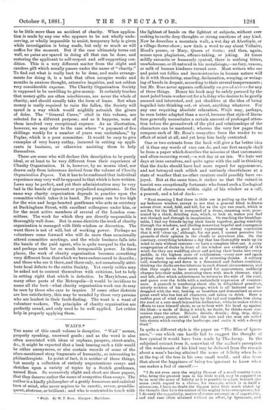THE WORK OF THE CHARITY ORGANISATION SOCIETY.*
THE Charity Organisation Society is yet in infancy. It has been in existence some twelve years, but in that short time it has grown amazingly. In spite of difficulties and misrepre- sentation, of hostile criticism and its own mistakes, it has become a great power ; affiliated societies are working in con- nection with it in most of our larger towns and in many parts of the United States, and in the future it promises to assume truly gigantic proportions. As yet, however, the nature of its work is often misunderstood ; so much so, indeed, that it must sorely perplex many people to find men and women, with means, leisure, and ability, devoting the greater part of their lives to labours which are supposed to be mainly repressive and nega- tive in their results. This would be a strange fact, if it were a fact at all. But it is not. Recent trials have brought one side of the work into exceptional prominence, and, in consequence, many people suppose that the chief function of the Society is the detection of imposture. It must, however, be remembered that, for example, in the case of "Wailer v. Lock," the Society was the prosecuted, not the prosecuting, party. It is a part of the duty of the Society to find out the truth about persons or institutions, when inquiries concerning them are made at its Office, and to report to the inquirers. There is no need to apologise for this branch of its work, which is necessary and useful. But if this were all, it would be impossible to under- stand the enthusiasm and devotion which are often displayed in the cause of Charity Organisation. The work of dividing the sheep from the goats, if the dividers paused at the division and then considered their work done, would not appear attrac- tive. But even inquiry is undertaken, not so much in order to detect as to assist. Investigation is the necessary prelimin- ary to assistance, and without it there would be no possi- bility of telling what sort of assistance could be tendered with advantage. No doubt, in a large proportion of instances, inves- tigation shows that nothing can be done, that advice would be pearls for swine, that money given would go straight to the publican, or that the applicant trades in obtaining charity by false representation. But wherever it is possible to help, the Society is forward to assist. Ill-directed charity occupies itself in setting up the ninepins knocked down in the world's rough play, regardless of the fact that fresh balls are coming imme- diately to overthrow them again. Organised charity is equally occupied in lifting up all thwe that are down ; but it aims at
• Charity Organisation Papers. London ; Longmans, Green, and Oo. 1881.
more permanent results. It does not content itself with setting the fallen man on his legs, and there leaving him to be hustled by the crowd, and stand or fall, as may happen. It endeavours so to help him that he may henceforth stand in his own strength against all shocks. By various means, on a small as well as on a large scale, in dealing with the individual as well as with the evils of society, charity organisation tries to remove the causes of distress. Among those causes is the existence of a class who prey upon charity, and divert it from its proper objects, and therefore, it is part of the work of the Charity Organisation Society to throw light into the holes and corners of which they are the tenants. But the Society does not stop there. Its best and truest work lies in helping ; helping those who deserve help, helping all those whom it is possible to assist, even the unde- serving, if they can be induced to help themselves.
The Charity Organisation Papers have been published at various times, and are now collected into a single volume for the use chiefly of actual workers in Charity Organisation Com- mittees. They describe the objects of the Society, and the best methods of starting and conducting local associations, and give very valuable information as to the principles and practice of the Society. But even those who take an outside interest in charity organisation may find it worth while to consult this book, if they wish to correct or confirm their ideas of charity organisation. Apart from the technical details, there are many indications of the lines on which the Society works, and the reader may discover for himself, even without going further, if his imagination be tolerably active, the nature of a good deal of the Society's work, and the answer to many criticisms passed upon it. Each district committee is an independent body, collecting, as far as possible, the necessary funds, and deciding upon its own responsibility the cases which come before it. The com- mittee is properly composed chiefly of representatives of the various charitable agencies in the district ; so that each is there represented, and the committee is in fact a charitable clearing- house, a central committee of charities, bringing all the charit- able work to a common centre of mutual knowledge and information. If this were always the case, there would be com- paratively little need for the committee to give money out of its own funds. The Society "does not desire to supersede local agencies, but to be representative of all such within its area." Whenever a case of deserving distress came before the committee, one of its members, who represented the charity dealing with that class of cases, would undertake its relief. Bnt some charities will not act with the Charity Organisation Society. In some districts there are no charitable agencies competent to deal with certain cases; and it is often impossible to persuade charitable bodies to give such relief as would be really required in order to effect a permanent benefit. It is, therefore, often necessary for a Committee itself to undertake the relief of many cases ; and hence a certain bewilderment is caused in the minds of many, who cannot make out whether the Society is or is not a relieving agency. The fact is that the Society undertakes, as far as possible, to obtain relief wherever relief can be given with real advantage, and itself to give that relief when it cannot be otherwise obtained. To put relief in the fore-front of its work, and to give without effort to obtain relief, would be "to supersede local agencies," which for many reasons is undesirable. On the other hand, to wait until relief can be got from other sources, would mean that many cases would not be assisted at all; and in others, that great and needless delay would take all grace and much value from the grant or loan. Committees have to steer between Scylla and Charybdis as best they may, according to local cir- cumstances, and the extent to which co-operation with other agencies is possible.
But whoever wishes really to understand the work of the Charity Organisation Society, must see it in the best com- mittees. The balance-sheet, which is so often made the basis of criticism, really tells very little. Much relief is given in the shape of loans. Very much is obtained from other sources, with little if no expenditure of the funds of the committee. Those who compare the income of the Society with its payments in relief, have no idea of the amount of thought and labour which has been expended. These critics have probably been trained in a different school ; and their idea is that money will heal all evils, and that a case of distress can be at once dis- missed with a certain sum in ready coin. This is a very simple and easy method, which certainly requires no organisation or expensive machinery. But the Society holds a gift of money to be little more than an accident of charity. When applica- tion is made by any one who appears to be not wholly unde- serving, or wholly impossible to assist, temporary help is given while investigation is being made, but only so much as will suffice for the moment. But if the case ultimately turns out well, no pains are spared in doing all that can be done, and restoring the applicant to self-respect and self-supporting con- dition. This is a very different matter from the slight and careless gift which usually passes under the name of "charity." To find out what is really best to be done, and make arrange- ments for doing it, is a task that often occupies weeks and months in anxious thought, extensive inquiries, and not seldom very considerable expense. The Charity Organisation Society is supposed to be unwilling to give money. It certainly teaches that money-gifts are often mischievous, are never the whole of charity, and should usually take the form of loans. But when money is really required to raise the fallen, the Society will spend in a way which would mightily astonish the givers of doles. The "General Cases," cited in this volume, are selected for a different purpose ; and as it happens, none of them involved very exceptional expense. As an illustration, however, we may refer to the case where "a payment of five shillings weekly for a number of years was undertaken," by Poplar, which is a poor committee. It would be easy to give examples of very heavy outlay, incurred in setting up appli- cants in business, or otherwise assisting them to help themselves.
There are some who will declare this description to be purely ideal, or at least to be very different from their experience of Charity Organisation. It is, however, by no means ideal, nor drawn only from inferences derived from the volume of Charity Organisation Papers. Yet it has to be confessed that individual experience may very well be opposed to that which is here written. Laws may be perfect, and yet their administration may be very bad in the hands of ignorant or prejudiced magistrates. In the same way charity organisation depends in practice upon the committee which takes it in hand. No praise can be too high for the wise and large-hearted gentleman who acts as secretary at Buckingham Street, with excellent colleagues under him, or for the most active members of several of the London com- mittees. The work for which they are directly responsible is thoroughly well done. But in some districts the work of charity organisation is managed with little wisdom or discretion. The want there is not of will, but of working power.- Perhaps no volunteers come forward who will do more than occasionally attend committee meetings, and the whole business falls into the hands of the paid agent, who is quite unequal to the task, and perhaps unfit for so much irresponsible power. In these places, the work of charity organisation becomes something very different from that which we have endeavoured to describe ; and those who see it there, and there only, not unnaturally attri- bute local defects to the entire Society. Yet surely critics may be asked not to content themselves with criticism, but to help in setting right that which is defective. In Marylebone, and many other parts of the Metropolis—it would be invidious to name all the best—what charity organisation work can do may be seen by those who care to inquire. If some other districts are less satisfactory, this may be mended by those very persons who are loudest in their fault-finding. The want is a want of volunteer workers. The principles of charity organisation are perfectly sound, and only need to be well applied. Let critics help in properly applying them.































 Previous page
Previous page